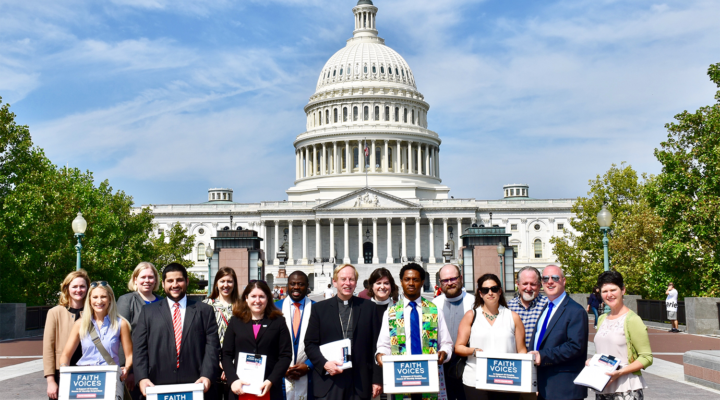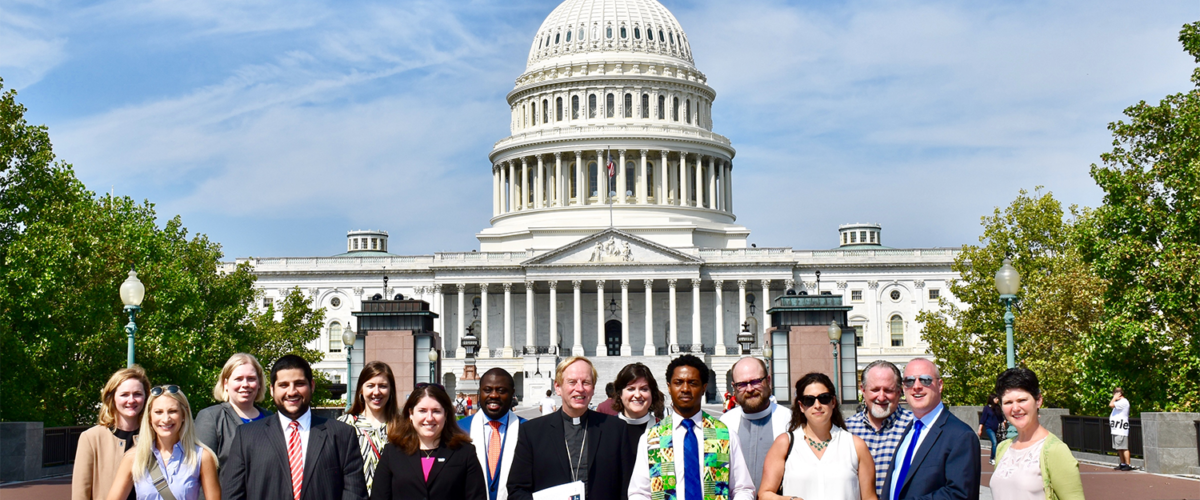More than 1,000 Baptist leaders signed an open letter delivered to Congress Aug. 16 opposing all efforts to weaken or repeal a section of the tax code that prevents tax-exempt nonprofit organizations from endorsing or opposing candidates for public office.
In all 4,000 religious leaders signed the letter defending the “Johnson Amendment” — named after President Lyndon Johnson, who introduced the measure when he was a senator from Texas in 1954 — saying the current law protects houses of worship from becoming centers of partisan politics.
“We have heard an outcry from faith leaders across the country about changing the tax law to encourage churches to issue campaign endorsements,” said Amanda Tyler, executive director of the Baptist Joint Committee for Religious Liberty and an organizer of Faith Voices, a collective of interfaith religious groups opposed to any repeal or weakening of the Johnson Amendment.
Tyler encouraged other clergy and leaders to join the 4,000 “early adopters” in an ongoing effort to send a strong message to Congress.
Tyler said groups including Americans United for Separation of Church and State, the Religious Action Center of Reform Judaism, Franciscan Action Network and Interfaith Alliance all believe lifting the electioneering ban would divide communities of faith and distract from their religious mission.
They joined together to create Faith Voices as a platform to collectively address lawmakers about their concern that encouraging churches to take sides in campaigns will result in houses of worship becoming cogs in the political machine.
“When we talk about the Johnson Amendment, we are really referring to a section of the tax law that’s been in place more than 60 years,” Tyler said in remarks delivered on the east side of the Capitol complex before hand-delivering the signed letters to members of the Senate.
“It applies to all 501(c)3 nonprofit organizations, including most houses of worship — churches, synagogues, mosques — and it just says that in exchange for that most-favored tax status — for the ability to be tax exempt and for the ability for your donors to deduct their contributions to your house of worship — that you agree not to participate or intervene in partisan candidate elections.”
The idea that organizations claiming tax-exempt status cannot collect contributions on behalf of political campaigns or make any statement for or against a particular candidate was uncontroversial when the law was passed. It has been rarely enforced by the IRS, but recently it has come under attack from conservative Christian groups arguing that it restricts free speech by censoring the content of a pastor’s sermon. The Alliance Defending Freedom has organized Pulpit Freedom Sunday encouraging pastors to preach explicitly political sermons in an act of civil disobedience since 2008.
In February President Trump promised to “get rid of and totally destroy” the Johnson Amendment. In May he signed an executive order directing the executive branch to limit its enforcement of the law.
In April, 99 religious groups including the Alliance of Baptists, American Baptist Churches USA, Association of Welcoming and Affirming Baptists, Baptist Joint Committee for Religious Liberty, Baptist Peace Fellowship of North America, Baptist Women in Ministry, Cooperative Baptist Fellowship, New Baptist Covenant and other Baptist groups joined in an open letter urging members of Congress not to follow the president’s lead in seeking a total repeal.
Tyler said yesterday the Johnson Amendment “means basically that you agree not to endorse or issue statements in opposition to candidates for office or do other things that are involved in those partisan candidate campaigns.”
“This leaves a lot of room for tax-exempt organizations to still be involved in our political process,” she said. “Of course from the pulpit, using tax-exempt resources, clergy can speak on the issues of the day — political, moral issues of the day — just like I know many pulpits were full this weekend in talking about the horrific events in Charlottesville.”
“That kind of speech is permitted, of course, and doesn’t affect our tax-exempt status,” she said. “Clergy also, in their personal capacities, can be as involved in the political process as they want, even endorsing candidates if that’s what they choose. They just can’t do it with tax-exempt resources.”
“And of course houses of worship can also be involved in non-partisan ways in our elections: doing voter registration, voter mobilization, all of those things,” she said. “It’s just this narrow prohibition on using tax-exempt, tax-deductible resources, for promoting people’s campaigns. It’s been in the tax law now for over 60 years. The vast majority of Americans support this law, and only recently has it come under attack.”
A number of Baptists who signed the letter share testimonials about why they oppose efforts to weaken or repeal the Johnson Amendment at BJConline.org/Faith-Voices.
“These actions promise to divide religious communities, literally left and right, transforming them into agents of political parties,” said Bill Leonard, James and Marilyn Dunn Professor of Baptist Studies and professor of church history at Wake Forest University Divinity School.
“I can’t think of anything more divisive and toxic for houses of worship than to be co-opted or pressured by politicians seeking endorsements during campaign seasons,” added Julie Pennington-Russell, pastor of First Baptist Church in Washington, D.C.
Ferrell Foster, director of ethics and justice for the Texas Baptist Christian Life Commission, said the Johnson Amendment “has served us well as a nation and as churches.”
Previous stories:
Baptist groups among faith organizations opposing Johnson Amendment repeal
BJC head warns Johnson Amendment rollback would divide churches
Head of Baptist advocacy group says Johnson Amendment good for churches


